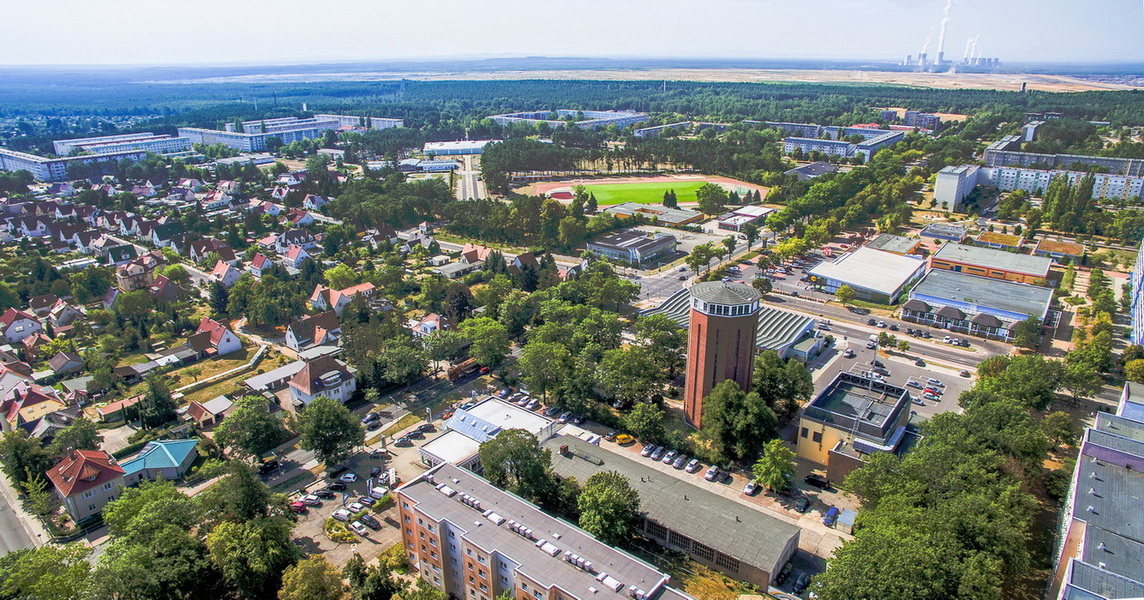
Weißwasser/O.L. is a large district town with a population of 15,000 in Lusatia, Saxony. Located in the immediate vicinity of the Nochten opencast lignite mine, Weißwasser is part of the major structural change in Lusatia due to the decision to phase out coal in 2038, which offers both challenges and opportunities. Today, all that remains of one of the most important glass-producing industrial centres in Europe before the reunification is a glassworks. The number of inhabitants has more than halved since reunification.
Special gems of the town are the old industrial and residential buildings in the Bauhaus style, the wealth of lakes and, in the immediate neighbourhood, the Fürst Pückler Park in Bad Muskau. Many people are creatively committed to a successful transformation process in Weißwasser.
In addition, 2023-24 was accompanied by a Municipal Development Counciljointly realised by the Berlin Governance Platform and the city of Weißwasser, and funded by the Federal Ministry for the Environment, Nature Conservation and Nuclear Safety as part of the funding programme "Municipal model projects for the implementation of ecological sustainability goals in regions undergoing structural change" (KoMoNa)this development.
The city of Weißwasser is facing major changes in the coming years: the centralised supply of lignite will come to an end from 2029. A municipal development advisory board is currently discussing how the town can sustainably adapt to the new times. Social, ecological and economic criteria play a role here. After all, the quality of life in the city also determines whether people want to stay or move here.
✳
We have greenery, we have space, we have water - in times of an overheating planet, the characteristics of the periphery can become locational advantages. Looking at their city together, the KEB participants discuss the strengths and weaknesses, opportunities and risks that Weißwasser harbours for sustainable urban development. They look at the energy system, potential consequences of climate change in the region - especially heat and drought - and what invites people to stay and makes life in the city attractive for them.
Most of them have lived in Weißwasser for a long time. One of them is happy to finally be able to live locally again after years of commuting. Many are drawn back to Lusatia after years of teaching and working in the rest of Germany. And even newcomers want to help shape their new home in the KEB. Many, but by no means all, know each other. The KEB is therefore also an exciting place to meet new faces in Weißwasser and people who enjoy organising and are motivated to make a difference. From 17 to 77.
It is to be expected that some things will be discussed controversially - and it would be a shame if they were not. Because the different perspectives, if they are well negotiated in dialogue, ultimately lead to better results. This makes it all the more important that there is a good working basis for constructive dialogue. The participants set this right at the beginning. "How should we work together here so that you enjoy it and find it meaningful?" Many suggestions were made in response to the moderation team's question, which resulted in a joint agreement on cooperation.
Then it was about sustainability. Just because a word is widely used does not mean that everyone understands it in the same way. Prof Hildebrandt from Zittau University of Applied Sciences was an expert on what is not sustainable globally and locally: which resources are being depleted and how, which ecological buffers and sinks are being used and how. And why it makes sense to approach things differently: to run the economy in cycles, more efficiently, and to decouple prosperity from resource consumption.
It's a long road that needs people at many levels. The first ideas on how this can be done in the urban area have already emerged from the analysis of strengths and weaknesses. This is now the basis for further work in October, November and January. We can look forward to it. And: the urban community is also invited to get involved. In October, the KEB will organise a competition with a prize money of 30,000 euros for the first three places.